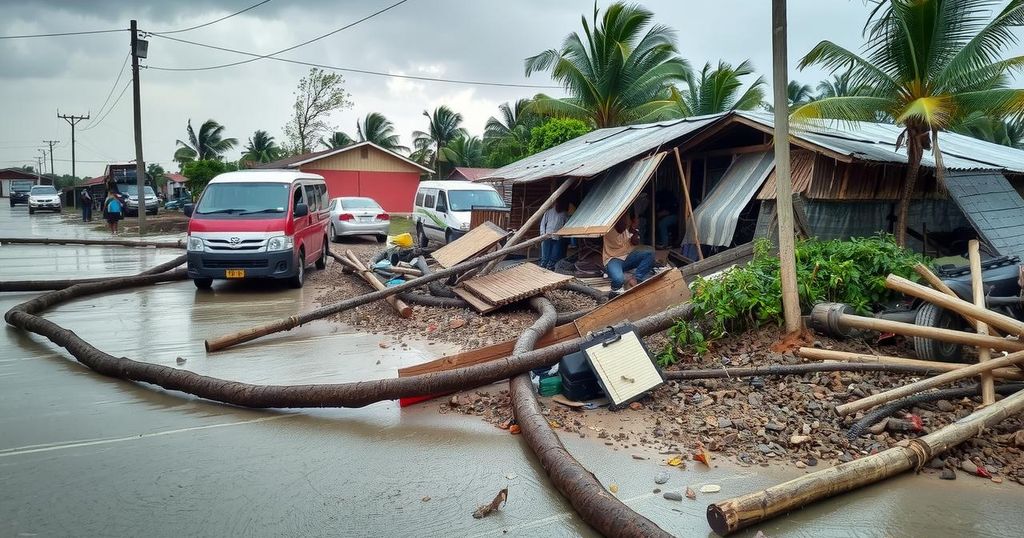Mozambique’s Humanitarian Crisis Following Tropical Cyclone Chido

In December 2024, Tropical Cyclone Chido struck Mozambique, causing widespread devastation, affecting over 453,000 individuals, resulting in fatalities, and destroying homes, schools, and health facilities. The cyclone exacerbated pre-existing crises, including conflict and cholera outbreaks, underscoring the urgent need for humanitarian assistance and resources to support recovery efforts.
Communities in Mozambique are experiencing the devastating aftermath of Tropical Cyclone Chido, which made landfall on December 15, 2024. The cyclone unleashed torrential rains exceeding 250 mm in just 24 hours, along with winds reaching up to 120 km/h. By December 16, the cyclone had moved into Malawi and dissipated over Zimbabwe by December 17. The destruction inflicted by the cyclone is extensive, and the immediate needs of the affected populations are dire. The National Institute for Natural Disasters (INGD) reported that as of December 24, approximately 453,971 individuals have been impacted, with at least 120 fatalities and 868 injuries recorded. Over 70,000 houses, 250 schools, and 52 health centers have either been completely or partially destroyed, with these numbers expected to increase as ongoing assessments reveal the full extent of the damage.
Cabo Delgado Province has been particularly hard-hit, with an estimated 272,000 people affected. The multi-agency assessment mission (MIRA) conducted by INGD, with support from the Office for the Coordination of Humanitarian Affairs (OCHA) and partners, revealed alarming levels of devastation. In Mecufi, nearly all homes were razed, leaving families without shelter. For many residents who already lived in makeshift accommodations, Cyclone Chido exacerbated their vulnerability, stripping away their shelters and essential supplies.
In Nampula Province, districts such as Erati and Memba are similarly affected, with around 175,169 people impacted and significant buildings destroyed. The region is also contending with a cholera outbreak, complicating the public health crisis, especially as damaged infrastructures hinder efforts to deliver crucial medical assistance. Furthermore, unclear communication channels due to poor mobile coverage impede the coordination of evacuation efforts and the provision of necessities.
Efforts by the government to prepare and respond to the situation have been effective in some areas, with early evacuations and warnings issued to communities as Cyclone Chido approached. A collaborative response is underway, albeit hindered by scarce resources. Humanitarian partners are scaling up their response efforts, focusing on providing relief to the most vulnerable populations. However, the overwhelming needs created by the cyclone far exceed existing humanitarian capacities.
Furthermore, the current disaster coincides with pre-existing crises, such as violence-induced displacements affecting Cabo Delgado’s residents. Immediate humanitarian assistance is imperative to provide shelter, food, safe drinking water, medications, and sanitation facilities to prevent further outbreaks of water-borne diseases. Repairs to health facilities are critical for adequate emergency services, and the restoration of schools is necessary to ensure children can continue their education despite the conflicts they face.
The cyclone has also intensified protection concerns, especially for vulnerable groups such as women and children. Reports of increased gender-based violence in the aftermath are alarming, necessitating prioritization of responses that ensure safety and support for survivors. Particularly worrying is the need for mental health services to assist those traumatized by the cyclone’s impact.
The response to this disaster is critically underfunded, occurring at the end of the fiscal year when financial resources are generally limited. Mozambique is also grappling with concurrent challenges of droughts, conflict, and cholera outbreaks, necessitating urgent replenishment of humanitarian resources. This situation presents a pivotal opportunity to act swiftly to contain cholera, support agriculture, and provide essential supplies before the agricultural season begins.
In summary, the scale of devastation caused by Tropical Cyclone Chido extends beyond immediate physical destruction. The humanitarian crises are compounded by prior conflict and the ongoing drought, presenting formidable challenges that require a coordinated and well-resourced response. Ensuring the immediate and efficient delivery of aid is crucial to restoring essential services and assisting the recovery of affected communities.
Tropical Cyclone Chido made landfall in Mozambique in December 2024, causing substantial damage across several provinces. As a result, hundreds of thousands are now displaced, with urgent humanitarian needs stemming from both the cyclone itself and the pre-existing challenges faced by the population, including conflict and disease outbreaks. This disaster further complicates an already dire humanitarian situation, necessitating immediate and comprehensive relief efforts to support the affected individuals and communities.
The aftermath of Tropical Cyclone Chido necessitates an urgent and robust humanitarian response to address the extensive needs of the affected populations. With the compounded impact of prior crises, including violence, drought, and health emergencies, it is imperative that resources are mobilized swiftly to provide shelter, essential supplies, health services, and protection for vulnerable groups. A coordinated effort among government agencies, NGOs, and humanitarian partners is essential to mitigate the immediate impacts of this disaster and support the long-term recovery of affected communities.
Original Source: www.unocha.org






